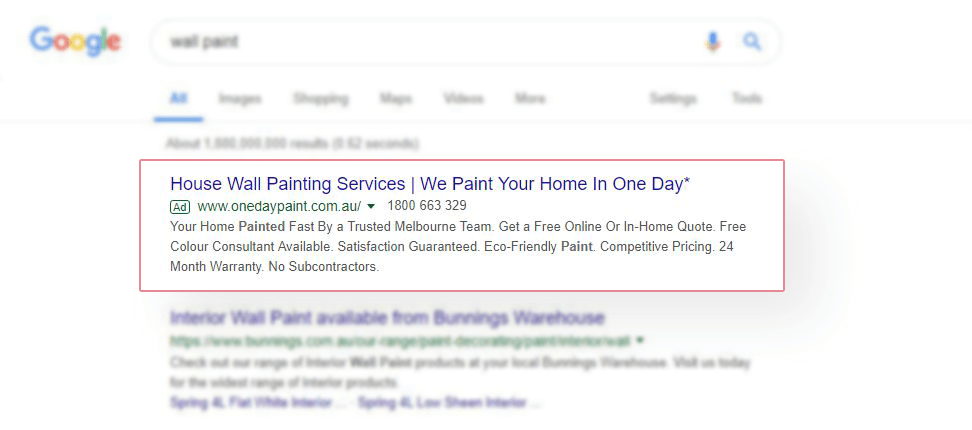The Difference Between SEO and SEM — Intro Guide
By Anthony Indraus April 11, 2019
The difference between SEO and SEM; As a business owner or a person that’s dabbling in marketing, you have probably heard the two terms before, or even received an email from someone trying to sell you their services.
SEO and SEM, have become a vital part of any digital marketing strategy efforts, they target the one thing we use on a daily basis; Online Search (specifically Google Search).
In this post I wanted to give you an intro guide that can shed some light on what the two mediums are, and what they mean, and how they can help your business and why your digital marketing strategy should have a focus on SEO (Search Engine Optimisation) and SEM (Search Engine Marketing).
But before I get started, let’s get one thing out of the way, this is not a one or the other comparison, SEO and SEM work hand in hand.
What is SEO (Search Engine Optimisation)?
SEO, or Search Engine Optimisation, is the process of optimising and changing websites in order to affect the ranking and visibility of websites in search engine results pages.
SEO is a non-paid form of optimisation (You results show organically, not a paid ad), to increase the quality and quantity of the traffic the website receives through non-paid search engine results.
The basic principle of Search Engine Optimisation without getting too technical is understanding what and how your prospects use search engines, what words they are using to find what they want, and modifying your web pages to assist Search Engine Crawlers in presenting your pages as a relevant result to what your prospects are searching for.
For example; When you search for the term “Thai Restaurant in Melbourne” on Google, the Crawlers will search Google’s archives of indexed pages, and present all pages that meet the searched term, with the top ones being the most relevant, and Google bases relevancy on over 200 factors that we can get into in a different post, SEO is the process of telling and convincing Google that page X is relevant to the searched term.
It is also worth mentioning there are two types of SEO, both usually are done on an ongoing basis, but to give you a basic understanding of them;
On-page SEO – Is optimizing individual pages on a website, rectifying any technical issues, and adjusting page content to reflect the target keyword.
Off-page SEO – This technique is used to build a website’s reputation and image by connecting it to other websites, preferably of higher status, in the search engine results. They involve link building, managing local listings, and directory profiling. Off-page SEO validates the brand as trustworthy and reliable so as to increase its search ranking.
What is SEM (Search Engine Marketing)?
SEM, or Search Engine Marketing, is the practice of using the paid search engine features to market a business through appearing on their SERPs (Search Engine Results Page).
With SEM, you bid on keywords that your potential customers might enter when searching for similar services or products to your offering. It allows your website pages to appear within the Search Results page, alongside organic results for those queries.
SEM is also referred to as Paid Search Ads, Paid Search Advertising, PPC (Pay-Per-Click), CPC (Cost-Per-Click), and CPM (Cost-Per-Thousand Impressions), all those terms mean the same thing, well not technically but they refer to the same thing.
In saying that, SEM is becoming increasingly pricey due to its bidding nature, the more companies are bidding for the same keyword, the more the cost per click rises, so it is important to identify keywords that only target customers that are in the buying process would use, to drive down your cost per acquisition.
Which Strategy is Better?
Now pick your side! A lot of marketers and experts will fight for one or the other, mentioning a lot of pros and cons to each side of the equation, but I’d like to advocate for both and mention some pros and cons.
SEO
The internet is becoming full of fluff information every day, every time you search something you get 1mil+ results, which presents a great opportunity for great content, and businesses with great insight to share, SEO will help you rank organically, and yes, some of the traffic you will receive from organic search will not be converted into sales, but it helps you and your business be positioned as experts in the field.
Pros
Visibility — Allows your brand or business website to harness the power of search engines, by displaying your website pages according to your prospective client’s search queries. Gaining trust and positioning as an expert in the field.
Free Traffic — Once your website is ranking for top keywords, you will see a spike in your website traffic for free, organic search results especially the top 10 results, in one study it was shown that the #1 spot receives 33% of the traffic.
An advantage over Competitors — having your website in the top rankings in Google, give you a strategic advantage against your competitors, helping you win and retain a larger percentage of the market share.
Cons
It takes time — SEO takes a long time, sometimes months to start ranking for specific keywords (Don’t trust companies that say will get you ranked within a month!), it will require consistency and a lot of effort.
Website Redesign — If you have an existing website and you decide to implement SEO as part of your marketing strategy, you might get a surprise in the form of a Request for a Website Re-Design! SEO relies heavily on website structure and content, so you might need to cover some upfront cost.
Ongoing Cost — It is not cheap, and it is a long term commitment, SEO is an ongoing endeavor, it requires consistent changes and updates to your web pages, to make sure your pages are always relevant and offer value to your clients.
No Guarantees — No company can offer guarantees when it comes to SEO, your website is under the mercy of the Search Engine Algorithm, any changes can affect your ranking.
SEM
Don’t take your pick yet, while SEO might look and sound like a daunting task, Search Engine Marketing comes with its own set of pros and cons, there is no one solution that fits all when it comes to digital marketing, SEM shines when it comes to immediate results and visibility, below are some pros and cons;
Pros
Laser-Focused Targeting — With SEM you get to choose what specific keywords or phrases you want to show your ad for, you can identify keywords or phrases that only customers with a buying intent would use, and remove any keywords that would bring no return.
Stability — You won’t be under the Algorithm’s mercy, your ad will show for the targeted keyword no matter what changes happen to how the search engine algorithm works.
A/B Testing — The ability to A/B test different pages for different keywords, without the need to worry about rebuilding page authority or ranking, find the perfect combination of keywords and sales letters to drive your conversion up.
No Obligations — You don’t need to make long term efforts, you can always pause your marketing campaign whenever you feel like it, unlike SEO where you need to invest a lot of time and effort to start seeing results.
Cons
High Cost — While the benefits are great, they come at a steep cost, with SEM you pay per click, which can be an astronomical number depending on the competition for the chosen keyword.
No Lasting Effects — Your ads won’t stick around! Once you stop your campaigns your ads will disappear no matter how long you have been running them for.
Conclusion
Hopefully, these two concepts are now clear. SEO and SEM are both unique methodologies for search marketing and both can have a great impact on the success of your digital marketing strategy. But even though they fall under the same category of digital and search marketing, they have their fair share of similarities and differences.
Both these techniques can and do help brands optimize their visibility on search result pages and both aim to display your business web pages when specific keywords related to the business’ industry, business or other offerings are used. Both SEO and SEM are designed in a way so as to increase traffic to a website and its business.
To make the most out of both techniques you need to have a great understanding of your customers’ online buying and decision making behaviours, if you would like to learn more and get started with your digital marketing strategy, we are currently offering a FREE strategy call to help you put together the basic blocks of your digital efforts.





